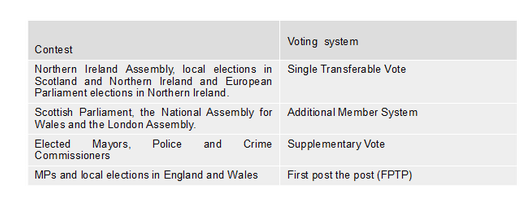|
In all the commentary on last week's elections, one aspect that I haven't seen remarked upon is that we now have an bewildering plethora of different electoral systems for different parts of the UK, indeed for different contests in the same part of the UK. Thus: I trust that's clear. Oh, sorry, I forgot that ancient bastion of our liberties: How to account for this? The main factor seems to be the determination of the main parties at Westminster first to 'fix' the Celtic fringes so as to avoid one party domination and encourage the children to play nicely with each other; and second, to ensure that they themselves shouldn't ever be forced to share power at Westminster. Labour and the Conservatives would rather take turn and turn about at unfettered single party government, than find themselves having to share power and make compromises.
In consequence, we always have a national government for whom only a minority have voted. And as turnout may be no more than 60%, and as the Electoral Commission estimate some 6 million people eligible to register don't do so, we are talking about UK governments routinely elected by no more than 20% of the adult population. No British government has been elected by a majority of votes cast since 1931. By contrast, in Scotland the SNP has just achieved 47% of the constituency vote and polled twice as much as its nearest rival in both constituency and regional votes, but is still short of a majority in the Scottish Parliament. But we can't just blame the politicians. The great British public overwhelmingly rejected proportional representation for Parliament in the 2011 referendum (which made such little impact that I just now thought to check that it actually occurred). Even the Scots, who have PR in their own Parliament, rejected it then for Westminster – go figure! Nor does anyone, left or right or centre, now seem to have a good word to say about the 2010-15 coalition government, the first since the War, - not even (perhaps particularly not) the Lib Dems. We seem to prefer our national governments strongly flavoured, undiluted as it were, however much we complain about their unwillingness to compromise when they are in power. And of course, FPTP tends to 'solidify' the two party system – it's very hard for a third party to gain seats. So the system is self-preserving (so much so, that in psephological circles, this is known as Duverger's Law). Of course, there are other electoral anomalies also. A voter in a tiny constituency such as the Western Isles have five times as much say as one in the Isle of Wight, the largest constituency. You are judged old enough at 16 to elect your government if you live in Dumfries but far too immature if you live a few miles away in Carlisle. These anomalies too are explained by purely party calculations. The SNP and Labour want lower voting ages because young people vote for them: so the Tories oppose it. Labour are unkeen on more equitable constituency sizes because they would be the losers. Labour favour block registration of all students, without their involvement, because they tend to vote left: the Tories moved to individual registration or the same reason. The day any party votes for a change in the electoral system that disadvantage it is the day pigs will fly in earnest. (One anomaly that can't be explained by party advantage or indeed, be explained at all, is that both Commonwealth and EU citizens resident here can vote for the Scottish parliament and Welsh Assembly, but only the Commonwealth ones can vote for Westminster. The idea seems to be that a Frenchman is obviously foreign but a Namibian isn't). And so we acquiesce in this strange patchwork of systems which means that, for example, a Welsh or Scottish voter in theory makes one set of calculations within one system to send a representatives to Cardiff or Edinburgh, another to send one to Westminster and yet another to send one to Brussels. One wonders who many voters understand the different systems. Yet their different mechanisms have important consequences for us all. Still, in the old psephological joke has it, the trouble with all conceivable electoral systems is that they invariably result in the election of – politicians.
0 Comments
Your comment will be posted after it is approved.
Leave a Reply. |
I was formerly Finance Director of the Prison Service and then Director of the National Offender Management Service responsible for competition. I also worked in the NHS and an IT company. I later worked for two outsourcing companies.
Archives
January 2023
Categories
All
Click below to receive regular updates
|


 RSS Feed
RSS Feed